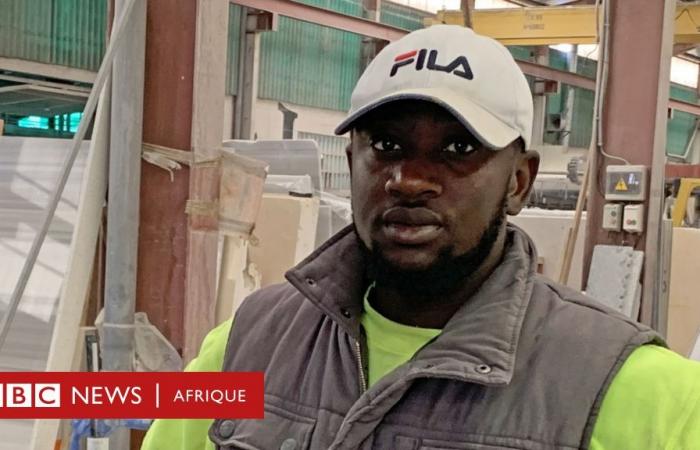- Author, Guy Hedgecoe
- Role, Business Journalist
- Reporting from Villaquilambre, northern Spain
-
5 hours ago
A group of men from sub-Saharan Africa play bingo in a hotel conference room near the northern Spanish city of León.
They laugh and rejoice when their numbers are announced, but many of these asylum seekers have harrowing stories.
Among them, Michael fled Ghana to escape a violent feud in which his sister and father were killed. After traveling overland to Morocco, he paid a trafficker who put him on an inflatable boat crowded with people that took him to the Canary Islands.
“I was so happy because I knew all my problems and the people who were trying to kill me were behind me,” he explains. “Once you are in Spain, you are safe. »
In Ghana, he worked as a gas station attendant and storekeeper. He has also started studying human resources management, which he hopes to continue in Spain once settled.
“Spain is one of the most respected countries in the world,” he says. “Being here is a chance for me. »
Photo credit, Getty Images
Around 170 asylum seekers are staying in this hotel in the town of Villaquilambre, transformed into a center for migrants.
They are among the thousands of people who use the sea route between the African coast and Spain each year.
Since the start of the year, more than 42,000 undocumented migrants have arrived in Spain, an increase of 59% compared to 2023, the vast majority of them having undertaken the perilous crossing to the Canary Islands.
The archipelago’s difficulties in managing this large number of migrants have contributed to a fierce political debate on immigration, mirroring what is happening in many other European countries. In Spain, the controversy is fueled largely by the far-right Vox party, which frequently calls the trend an “invasion.”
However, the arrivals also highlighted an important potential source of labor for an economy facing considerable demographic challenges.
Javier Díaz-Giménez, professor of economics at the IESE business school and pensions expert, explains that the baby boom that lasted from the mid-1950s to the end of the 1970s gave birth to a generation of Spaniards who are approaching retirement age, and the subsequent “baby crash” means there are not enough workers to replace them.
“The next 20 years will be crucial as more and more people retire,” he says. “According to the most recent demographic scenario, 14.1 million people will retire during this period. »
According to him, one of the ways to remedy the labor shortage is to draw inspiration from the economic model implemented by Japan, whose birth rate is equally low, by investing massively in algorithms and the machines. The obvious alternative is immigration.
“If you want to grow GDP, if you want to pay for the pensions of all the baby boomers who are retiring, you have to grow GDP in a different way than we do now, because it doesn’t “There won’t be as many people, unless we bring them in through immigration,” adds Professor Díaz-Giménez.
Photo credit, Getty Images
The Spanish central bank has quantified the expected labor shortage. In a report released in April, she said the country would need about 25 million immigrants over the next 30 years.
Spain’s left-wing government has also made economic arguments in favor of immigrants, with Prime Minister Pedro Sánchez describing them as representing “wealth, development and prosperity” for his country, during a recent tour of Mauritania, Gambia and in Senegal.
“The contribution of migrant workers to our economy is fundamental, as is the sustainability of our social security system and our pensions,” he said.
Mr. Sánchez’s coalition hopes that a proposal to legalize the status of 500,000 undocumented migrants, mainly from Latin America, will be adopted by Parliament. Spain has seen nine such mass regularizations during its democratic era, the last occurring in 2005 under a previous government led by the Spanish Socialist Workers’ Party.
However, the country’s economic needs contrast with the perception of immigration by ordinary Spaniards. A new poll shows that 41% of people are “very concerned” about the phenomenon, making it their fifth concern after inflation, housing, inequality and unemployment.
While only 9% of Spaniards associate immigrants with economic progress, 30% associate them with insecurity and 57% think there are too many of them.
Villaquilambre, meanwhile, is an example of how undocumented newcomers can integrate into the world of work.
Asylum seekers are allowed to work six months after arriving in Spain.
“Before they receive authorization to start working, we focus on learning Spanish and we offer them training and risk prevention courses,” explains Dolores Queiro, of the Foundation San Juan de Dios, the non-governmental organization that manages the Villaquilambre migrant center.
“When the date approaches when they can start working, we contact different companies – and they also contact us – and we start looking for work for them.
Companies contact us, she says, “because they know we have people here who want to work.”
Makan, originally from Mali, has just started working for a local company, GraMaLeon, which makes marble and granite walls, bathrooms and kitchen counters. Every day, he travels the short distance between the hotel and the factory on an electric scooter.
“I’m happy to work,” he says in halting Spanish, after carrying slabs of marble into the factory.
Ramiro Rodríguez Alaez, co-owner of the company, which employs around twenty people, explains that it is not easy to find workers.
“We need a lot of workers in this profession. But it’s a difficult job, it’s cold, you have to lift heavy weights, so it’s not a job that interests many young people here. »
“There aren’t many businesses in this sector here, but the ones that exist all need staff. We’re all looking for people locally and we can’t find them.”
He adds: “Immigrants are an important source of labor: “Immigrants are an important source of labor for us.






